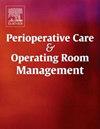Knowledge levels of surgical nurses regarding surgical site infections: A cross-sectional evaluation
IF 1
Q2 Nursing
Perioperative Care and Operating Room Management
Pub Date : 2025-01-06
DOI:10.1016/j.pcorm.2025.100461
引用次数: 0
Abstract
Introduction
Surgical site infections (SSI) are an important health problem that develop after surgical interventions and can have serious negative effects on patient health. Surgical nurses play a critical role in the prevention of these infections.
Objective
This study was conducted to determine the level of knowledge of nurses working in surgical clinics about SSI.
Method
The population of this descriptive and cross-sectional study consisted of 170 nurses working in the surgical units of Çukurova University Faculty of Medicine Balcalı Hospital. The sample of the study consisted of 142 (83 %) nurses who met the inclusion criteria in April-June 2024. The data were collected using a questionnaire form designed to test the socio-demographic characteristics of the participants and their level of knowledge about surgical site infection. In addition to descriptive statistics, ANOVA and Student t-test were used to analyse the data.
Results
Of the nurses who participated in the study, 78.9 % were female and 72.5 % received training on SSI in the institution. The mean number of correct answers given by the nurses to the questions about SSI was 20±2.4 and the mean number of incorrect answers was 8 ± 2.4. It was found that there was a statistically significant relationship between the number of correct answers given by the nurses and gender, age groups, education, working time in surgical units and in the institution, working style, and SSI training status (p < 0.05).
Conclusion
The results of the study suggest that increasing the level of knowledge of surgical nurses about SSI is of great importance in terms of preventing infections and ensuring patient safety. In this context, it is recommended that health institutions should organise continuous education programmes and nurses should actively participate in these programmes. In addition, it is recommended to improve the working conditions of nurses to increase the applicability of infection control measures.
外科护士关于手术部位感染的知识水平:一项横断面评估
手术部位感染(SSI)是手术干预后发生的重要健康问题,可对患者健康产生严重的负面影响。外科护士在预防这些感染方面发挥着关键作用。目的了解外科门诊护士对SSI的认知水平。方法采用描述性横断面研究,研究对象为Çukurova大学医学院巴尔卡莱医院外科科室的170名护士。研究样本包括2024年4 - 6月符合纳入标准的142名护士(83%)。数据收集采用问卷形式,旨在测试参与者的社会人口统计学特征和他们对手术部位感染的知识水平。除描述性统计外,采用方差分析和学生t检验对数据进行分析。结果参与研究的护士中,78.9%为女性,72.5%在该机构接受过SSI培训。护士对SSI问题的平均正确回答次数为20±2.4次,平均错误回答次数为8±2.4次。结果发现,护士的正确回答次数与性别、年龄、教育程度、在手术单位和机构的工作时间、工作方式、SSI培训情况之间存在显著的统计学关系(p <;0.05)。结论提高外科护士的SSI知识水平对预防感染、保障患者安全具有重要意义。在这方面,建议保健机构组织继续教育方案,护士应积极参加这些方案。此外,建议改善护士的工作条件,增加感染控制措施的适用性。
本文章由计算机程序翻译,如有差异,请以英文原文为准。
求助全文
约1分钟内获得全文
求助全文
来源期刊

Perioperative Care and Operating Room Management
Nursing-Medical and Surgical Nursing
CiteScore
1.30
自引率
0.00%
发文量
52
审稿时长
56 days
期刊介绍:
The objective of this new online journal is to serve as a multidisciplinary, peer-reviewed source of information related to the administrative, economic, operational, safety, and quality aspects of the ambulatory and in-patient operating room and interventional procedural processes. The journal will provide high-quality information and research findings on operational and system-based approaches to ensure safe, coordinated, and high-value periprocedural care. With the current focus on value in health care it is essential that there is a venue for researchers to publish articles on quality improvement process initiatives, process flow modeling, information management, efficient design, cost improvement, use of novel technologies, and management.
 求助内容:
求助内容: 应助结果提醒方式:
应助结果提醒方式:


